#kotlin technology
Explore tagged Tumblr posts
Text
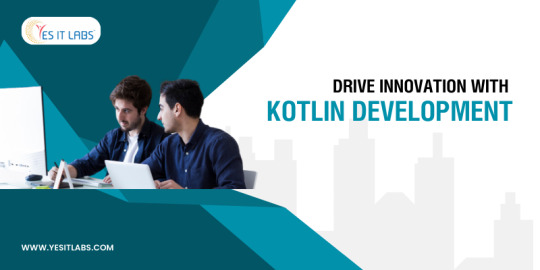
Discover why soft skills are crucial when hiring Kotlin developers. Learn how communication, teamwork, and problem-solving abilities can significantly impact the success of your Android project. Read more - https://www.yesitlabs.com/hire-the-right-kotlin-developers-for-your-android-project/
#- android development services#hire Android developer#hire kotlin developers#kotlin development services#kotlin technology#mobile app development#mobile app development company#Native Mobile Apps
0 notes
Text
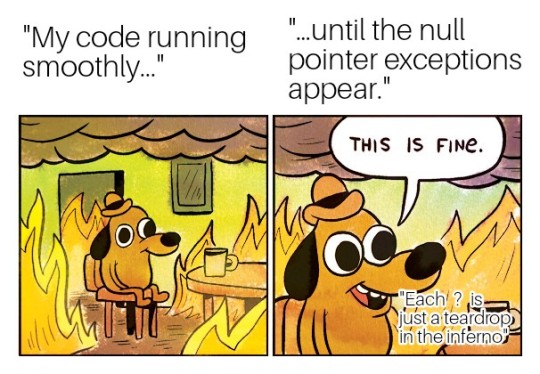
🎭 "My Kotlin code tonight: a beautiful, tragic ballet of null pointer exceptions. Each `?` a teardrop in the vast, unforgiving void of potential runtime errors. 🌌 It's a modern *Inferno*; instead of demons, I'm battling the ghosts of `null`. 👻 Send help (and maybe a bottle of something strong; I need a break). 🍷 Share your own #nullsafety tales!
2 notes
·
View notes
Text
0 notes
Text


Top 10 Mobile App Development Frameworks in 2024
Discover the top 10 frameworks in the tech world for mobile app development! Explore all the frameworks and find the right technology to bring your app to life.
Check out our latest blog for a detailed comparison!
#mobileappdevelopment#technology#appdevelopment#reactnative#flutter#xamarin#swiftui#kotlin#ionic#cordova#phonegap#sencha#unity
0 notes
Text

For any production support and bug fixes for mobile apps please reach out to us at www.upglocal.com or mail us at [email protected]
#appdevelopment#mobileapp#iosdevelopment#androiddevelopment#crossplatform#swift#kotlin#reactnative#mobileappdesign#appdev#customapp#upglocal#appdevelopers#technology#techsolutions#digitaltransformation#mobiletechnology#techinnovations#appsolutions#startups#businessgrowth#digitalbusiness#entrepreneurs#startupideas#innovativetech#futureoftech#techdevelopment#mobileapps#appideas#mobiledev
0 notes
Text

What to Look for When Hiring Android App Developers | AIS Technolabs
Discover the key qualifications and skills to seek in Android app developers. Make informed hiring decisions with our essential guide
#Android Development#Hiring Android Developers#Java vs Kotlin#Mobile App Development#Tech Stack#Android SDK#App Security#Cross-Platform Development#AI and Machine Learning#IoT Integration#5G Technology#AR and VR#Developer Skills#Project Management#App Development Trends
0 notes
Text
https://elecomco.com/kotlin-vs-python/
0 notes
Text
The World of Android Software Development Company
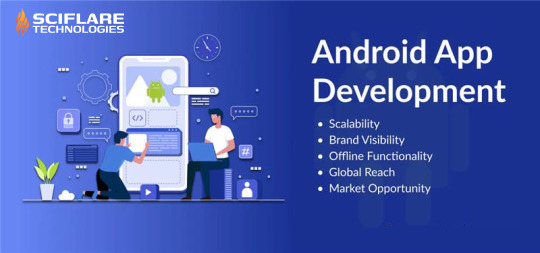
At Sciflare, we dive deep into the world of Android software development, crafting exceptional apps that meet your specific needs. Android software development company: Our team of experts breathes life into your ideas, turning them into intuitive and user-friendly experiences for millions of Android users. Reach us- Sciflare Technologies
#android#software#mobile app development#software company#mobile technology#application services#business#android world#kotlin#java
0 notes
Text
Conquering the Green Giant: A Comprehensive Guide to Android App Development in 2024
The Android operating system dominates the mobile landscape, boasting billions of users worldwide. For businesses and entrepreneurs, this translates to a massive potential audience for their app ideas. But how do you navigate the exciting world of Android app development in 2024? This comprehensive guide equips you with the knowledge to embark on your journey, whether you choose to develop the app yourself or partner with Android app development services.
Unveiling the Arsenal: Essential Tools and Technologies
Building a world-class Android app requires mastering a robust toolkit:
Java or Kotlin: While Java has been the traditional language for Android development, Kotlin, a more concise and modern language developed by JetBrains, is rapidly gaining popularity. Both languages are excellent choices, and some Android app development services specialize in each.
Android Studio: The official integrated development environment (IDE) from Google, Android Studio provides a comprehensive suite of tools for coding, designing, testing, and deploying your Android app.
Material Design: Google's design language, Material Design, offers a set of UI components and best practices to ensure your app adheres to a consistent and user-friendly look and feel.
Android SDK (Software Development Kit): This collection of tools and libraries provides everything you need to build apps for the Android platform.
Understanding the Development Process: From Concept to App
The Android app development process follows a structured approach:
Ideation and Planning: Every successful app starts with a compelling idea. Clearly define your app's purpose, target audience, and key features before diving into development.
User Interface (UI) and User Experience (UX) Design: Design an intuitive and visually appealing user interface that provides a seamless user experience. Prioritize user flows and ensure your app is easy to navigate and interact with. This is a crucial step that many Android app development services can assist you with.
Development: This is where your coding skills come into play. Utilize Java or Kotlin and Android Studio to write the code that brings your app's functionalities to life.
Testing and Debugging: Rigorous testing is essential to identify and eliminate bugs before launch. Utilize the testing tools within Android Studio and emulators to simulate different devices and Android versions.
App Signing and Google Play Store Launch: Once your app is polished, it's time to sign it with your unique key and publish it on the Google Play Store. Understanding Android app development services can help you navigate the publishing process.
Key Considerations for Modern Android App Development in 2024
The Android development landscape is constantly evolving. Here are some key trends to stay ahead of the curve:
Jetpack Libraries: Google's Jetpack libraries offer a collection of pre-built components and functionalities that simplify common development tasks and promote best practices.
Focus on Kotlin: With its growing popularity and official backing from Google, Kotlin is becoming the preferred language for Android development. Consider this when choosing Android app development services.
Android Instant Apps: This innovative feature allows users to try out specific features of your app without needing to download the entire app first.
Beyond the Basics: Resources and Getting Started with Android App Development
The world of Android development is vast and exciting, but it can also feel daunting. Here are some resources to get you started:
Android Developer Documentation: Google provides comprehensive documentation, tutorials, and sample code to equip you with the knowledge you need.
Online Courses and Tutorials: Numerous online platforms offer high-quality courses and tutorials to help you learn Java/Kotlin, Android Studio, and the intricacies of Android development.
Open-Source Libraries: The vibrant open-source community provides a wealth of pre-built code and libraries that can accelerate your development process.
Building Your Dream App: Whether you choose to develop the app yourself or partner with Android app development services, the journey to creating a successful Android app is an exciting one. By dedicating yourself to continuous learning, staying updated with the latest trends, and leveraging the available resources, you can transform your app ideas into game-changing realities on the Android platform.
0 notes
Text
Kotlin API development services
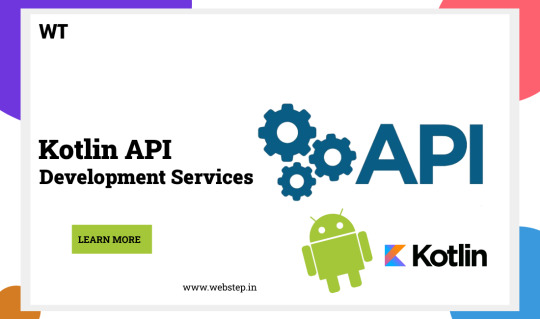
In the ever-evolving landscape of software development, Kotlin has emerged as a powerhouse, gaining popularity for its concise syntax, interoperability with Java, and seamless integration capabilities. As businesses seek to build robust and scalable applications, Kotlin API development services have become a focal point for developers. In this article, we'll explore the key aspects of Kotlin API development services and how they are reshaping the future of software architecture.
Why Choose Kotlin for API Development:
Kotlin, a statically typed programming language, brings a host of advantages to API development. Its succinct syntax reduces boilerplate code, making development more efficient and less error-prone. With full interoperability with Java, Kotlin allows developers to leverage existing Java libraries seamlessly, providing a smooth transition for projects migrating from Java to Kotlin.
Expressive and Concise Code:
Kotlin's expressiveness allows developers to write clean and concise code, enhancing readability and maintainability. This is particularly advantageous in API development, where simplicity and clarity are paramount. The reduced verbosity of Kotlin code not only accelerates the development process but also contributes to the overall quality of the API.
Enhanced Safety and Null Safety:
Kotlin is designed with a strong focus on null safety, addressing one of the most common sources of runtime errors. The language's type system helps eliminate the infamous null pointer exceptions, providing developers with a more secure environment for API development. This feature significantly contributes to the reliability and stability of Kotlin-built APIs.
Seamless Integration with Existing Java Codebase:
Kotlin's compatibility with Java extends beyond just syntax. This interoperability ensures a smooth integration process with existing Java codebases. Businesses can adopt Kotlin gradually, introducing it into their projects without the need for a complete overhaul. This flexibility makes Kotlin API development an attractive option for organizations with established Java infrastructure.
Coroutines for Asynchronous Programming:
Asynchronous programming is crucial in API development to handle concurrent tasks efficiently. Kotlin introduces coroutines, a powerful and lightweight concurrency design pattern, simplifying the complexity of asynchronous code. This feature allows developers to write asynchronous operations more naturally, leading to more responsive and scalable APIs.
Thriving Community Support:
Kotlin benefits from a vibrant and supportive community of developers. The community actively contributes to the language's growth, providing libraries, tools, and best practices for Kotlin API development. This support ensures that Kotlin stays aligned with industry standards and continues to evolve to meet the ever-changing demands of modern software development.
Conclusion:
In conclusion, Kotlin API development services offer a compelling solution for businesses seeking to build high-performance, scalable, and maintainable APIs. The language's concise syntax, enhanced safety features, seamless integration with Java, coroutines for asynchronous programming, and strong community support make Kotlin an ideal choice for forward-thinking developers and organizations. As we navigate the future of software architecture, embracing Kotlin API development services opens the door to innovation and sets the stage for a new era in application development.
#kotlin api development#kotlin app development#kotlin application#webstep#webstep technologies kolkata
1 note
·
View note
Text

If you are someone who can’t decide between Flutter and Kotlin Multiplatform, here’s the solution to your problem! Since every cross-platform framework is being compared to Google’s brainchild, Flutter, we created a comprehensive comparison guide with the emerging one– Kotlin Multiplatform. With this analytical overview, you can decide whether you should opt for Flutter or Kotlin Multiplatform with explicit “WHY.”
0 notes
Text
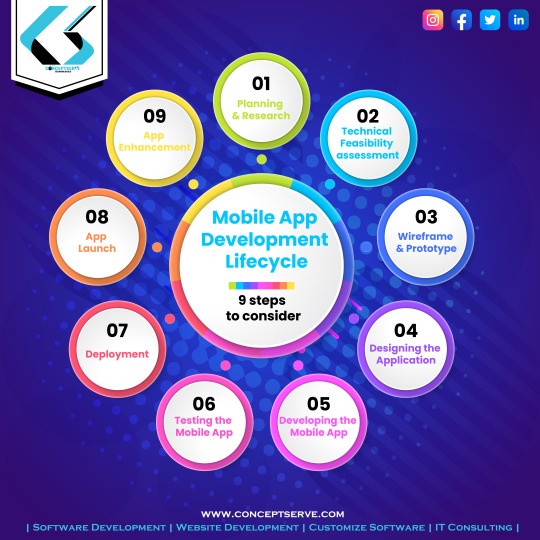
🚀If you're new to mobile app development, it can be helpful to have a guide to follow. Here's a step-by-step overview of the mobile app📱 development lifecycle✨.
Mobile App Development
#appdevelopmentlifecycle#flutter#androiddeveloper#appdeveloper#mobileappdeveloper#kotlin#reactnative#appdevelopment#iosdeveloper#websitedevelopment#website#itconsulting#mobileappdevelopment#itservice#software#technology#business#softwaredevelopment#webdevelopment#appdevelopmentcompany#cst#cstfamily#conceptserve#conceptservetechnologies
0 notes
Text
Android App Trends 2023

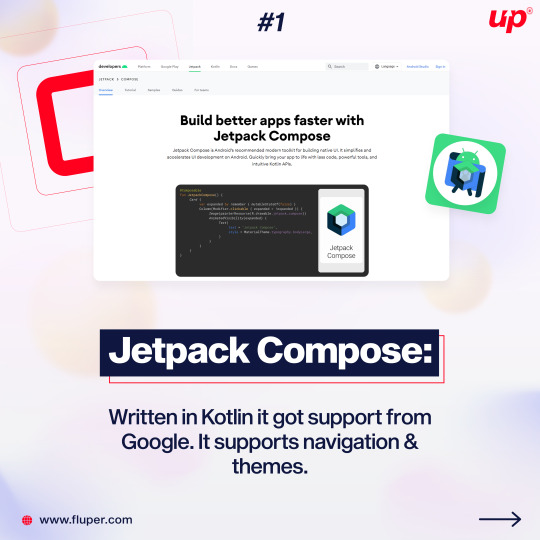
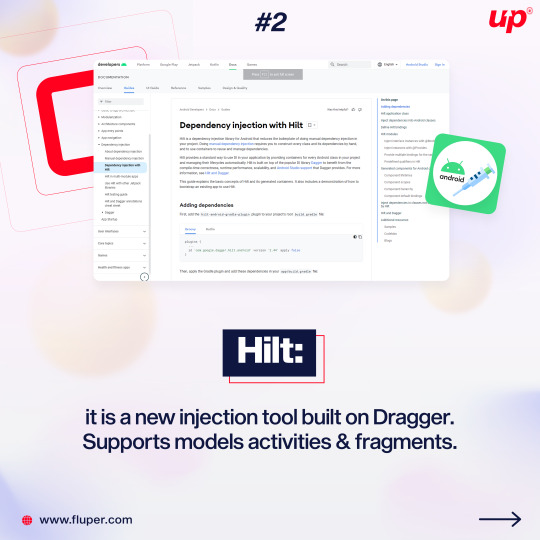
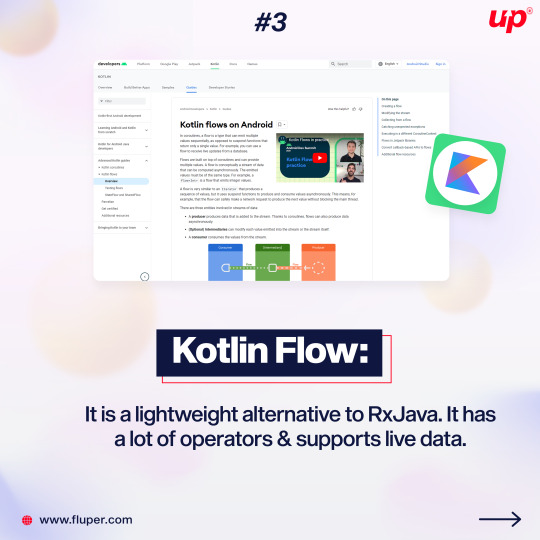

New tools and tech stack are entering the Android app development industry and changing the development practices. Fluper has a team of world-class developers using the best tools and technology in projects.
#fluper#androiapp#androidappdevelopment#hilt#kotlin#jetpack#javaprogramming#java#javascript#css#html#kotlindeveloper#development#appdevelopmentcompany#androidapp#technology
0 notes
Text
So I made an app for PROTO. Written in Kotlin and runs on Android.
Next, I want to upgrade it with a controller mode. It should work so so I simply plug a wired xbox controller into my phone with a USB OTG adaptor… and bam, the phone does all the complex wireless communication and is a battery. Meaning that besides the controller, you only need the app and… any phone. Which anyone is rather likely to have Done.
Now THAT is convenient!
( Warning, the rest of the post turned into... a few rants. ) Why Android? Well I dislike Android less than IOS
So it is it better to be crawling in front of the alter of "We are making the apocalypse happen" Google than "5 Chinese child workers died while you read this" Apple?
Not much…
I really should which over to a better open source Linux distribution… But I do not have the willpower to research which one... So on Android I stay.
Kotlin is meant to be "Java, but better/more modern/More functional programming style" (Everyone realized a few years back that the 100% Object oriented programming paradigme is stupid as hell. And we already knew that about the functional programming paradigme. The best is a mix of everything, each used when it is the best option.) And for the most part, it succeeds. Java/Kotlin compiles its code down to "bytecode", which is essentially assembler but for the Java virtual machine. The virtual machine then runs the program. Like how javascript have the browser run it instead of compiling it to the specific machine your want it to run on… It makes them easy to port…
Except in the case of Kotlin on Android... there is not a snowflakes chance in hell that you can take your entire codebase and just run it on another linux distribution, Windows or IOS…
So... you do it for the performance right? The upside of compiling directly to the machine is that it does not waste power on middle management layers… This is why C and C++ are so fast!
Except… Android is… Clunky… It relies on design ideas that require EVERY SINGLE PROGRAM AND APP ON YOUR PHONE to behave nicely (Lots of "This system only works if every single app uses it sparingly and do not screw each-other over" paradigms .). And many distributions from Motorola like mine for example comes with software YOUR ARE NOT ALLOWED TO UNINSTALL... meaning that software on your phone is ALWAYS behaving badly. Because not a single person actually owns an Android phone. You own a brick of electronics that is worthless without its OS, and google does not sell that to you or even gift it to you. You are renting it for free, forever. Same with Motorola which added a few extra modifications onto Googles Android and then gave it to me.
That way, google does not have to give any rights to its costumers. So I cannot completely control what my phone does. Because it is not my phone. It is Googles phone.
That I am allowed to use. By the good graces of our corporate god emperors
"Moose stares blankly into space trying to stop being permanently angry at hoe everyone is choosing to run the world"
… Ok that turned dark… Anywho. TLDR There is a better option for 95% of apps (Which is "A GUI that interfaces with a database") "Just write a single HTML document with internal CSS and Javascript" Usually simpler, MUCH easier and smaller… And now your app works on any computer with a browser. Meaning all of them…
I made a GUI for my parents recently that works exactly like that. Soo this post:
It was frankly a mistake of me to learn Kotlin… Even more so since It is a… awful language… Clearly good ideas then ruined by marketing department people yelling "SUPPORT EVERYTHING! AND USE ALL THE BUZZWORD TECHNOLOGY! Like… If your language FORCES you to use exceptions for normal runtime behavior "Stares at CancellationException"... dear god that is horrible...
Made EVEN WORSE by being a really complicated way to re-invent the GOTO expression… You know... The thing every programmer is taught will eat your feet if you ever think about using it because it is SO dangerous, and SO bad form to use it? Yeah. It is that, hidden is a COMPLEATLY WRONG WAY to use exceptions…
goodie… I swear to Christ, every page or two of my Kotlin notes have me ranting how I learned how something works, and that it is terrible... Blaaa. But anyway now that I know it, I try to keep it fresh in my mind and use it from time to time. Might as well. It IS possible to run certain things more effective than a web page, and you can work much more directly with the file system. It is... hard-ish to get a webpage to "load" a file automatically... But believe me, it is good that this is the case.
Anywho. How does the app work and what is the next version going to do?
PROTO is meant to be a platform I test OTHER systems on, so he is optimized for simplicity. So how you control him is sending a HTTP 1.1 message of type Text/Plain… (This is a VERY fancy sounding way of saying "A string" in network speak). The string is 6 comma separated numbers. Linear movement XYZ and angular movement XYZ.
The app is simply 5 buttons that each sends a HTTP PUT request with fixed values. Specifically 0.5/-0.5 meter/second linear (Drive back or forward) 0.2/-0.2 radians/second angular (Turn right or turn left) Or all 0 for stop
(Yes, I just formatted normal text as code to make it more readable... I think I might be more infected by programming so much than I thought...)
Aaaaaanywho. That must be enough ranting. Time to make the app
31 notes
·
View notes
Text
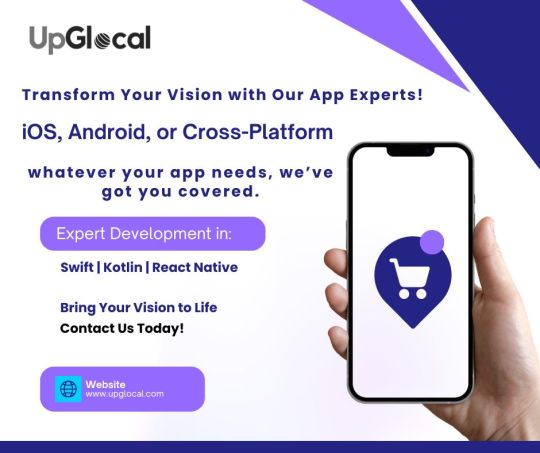
Transform Your Vision with Our Expert App Developers!
iOS, Android, or Cross-Platform, whatever your app needs, we’ve got you covered.
From Swift to Kotlin to React Native, our team will bring your vision to life with seamless development. Let’s build something incredible together!
Contact us today at www.upglocal.com or mail us at [email protected]
#appdevelopment#mobileapp#iosdevelopment#androiddevelopment#crossplatform#swift#kotlin#reactnative#mobileappdesign#appdev#customapp#upglocal#appdevelopers#technology#techsolutions#digitaltransformation#mobiletechnology#techinnovations#appsolutions#startups#businessgrowth#digitalbusiness#entrepreneurs#startupideas#innovativetech#futureoftech#techdevelopment#mobileapps#appideas#mobiledev
0 notes
Text
Greetings
Technology is magic, and I want to learn all the necessary incantations in order to create beautiful projects!
So far I know what classes are, and I can make a mean switch statement in C, C++ AND C#, so it comes as no surprise that I signed up to participate in an app making contest that's due in about one month.
I opened android studio and it scared me.
If anyone has any cool resources (doesn't have to be app dev related, I wanna learn anything and everything), I would greatly appreciate it. So far I've heard words such as kotlin and jetpack compose so I've been meaning to get into those.
After the app thingy is done, it's gonna be game making time babyyyyy.
I'll be using this blog to track my progress every day, and anytime I manage to do anything, it'll be a huge achievement for me :D
#studyblr#progblr#codeblr#coding#devlog#mobile app development#development#indiedev#ambitious#first post
3 notes
·
View notes